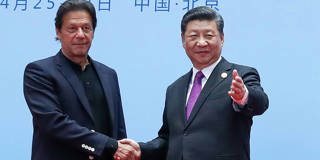 Valery Sharifulin/TASS via Getty Images
Valery Sharifulin/TASS via Getty Images
带路会成为中国的陷阱吗?
Yasheng Huang
发自剑桥—批评人士经常声称,中国正在利用其庞大的“一带一路”倡议作为某种形式的强制性“债务陷阱外交”,以对加入其跨国基础设施投资计划的国家施以控制。但正如约翰·霍普金斯大学的黛博拉·布劳迪甘姆(Deborah Brautigam)最近指出的那样,这种风险经常被媒体所夸大。事实上一带一路可能会带来另一种风险—对中国本身而言
https://prosyn.org/R4IrqdBzh
To continue reading, register now. It’s free!
Register Now
Already have an account?
Log in



发自剑桥—批评人士经常声称,中国正在利用其庞大的“一带一路”倡议作为某种形式的强制性“债务陷阱外交”,以对加入其跨国基础设施投资计划的国家施以控制。但正如约翰·霍普金斯大学的黛博拉·布劳迪甘姆(Deborah Brautigam)最近指出的那样,这种风险经常被媒体所夸大。事实上一带一路可能会带来另一种风险—对中国本身而言